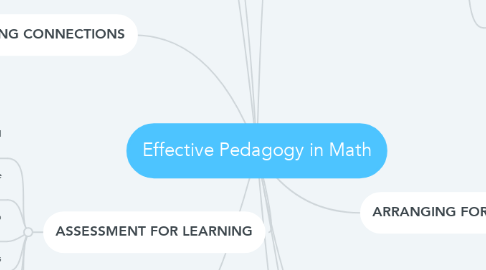Effective Pedagogy in Math
by Steph Macdonald

1. BUILDING ON STUDENTS THINKING
1.1. put student interest and knowledge at the centre of their teaching
1.2. take student understanding as a starting point for their teaching instead of trying to fill gaps
1.3. use real tasks to relate to students
1.4. pose new questions and tasks that will challenge student thinking
1.5. use student mistakes as teaching points and areas for growth
1.6. provide students opportunities to learn from their mistakes
1.7. provide appropriate challenges for ALL students, knowing what they CAN achieve
2. WORTHWHILE MATHEMATICAL TASKS
2.1. provide tasks and activities that will challenge students and allow original thinking
2.2. all students are given tasks that will challenge their thinking
2.3. ensure questions being asked require students to use problem solving skills
2.3.1. tasks are open ended
2.4. given opportunities to practice what the learned
3. MAKING CONNECTIONS
3.1. connections to different mathematical ideas
3.2. connections to different mathematical representations
3.3. connections to everyday life to make the math more meaningful to students
4. ASSESSMENT FOR LEARNING
4.1. use a wide range of formal an informal assessment
4.2. use diagnostic information to help guide their instruction
4.3. use on going assessment in the moment to know where to take the lesson
4.4. ask effective questions
4.5. give effective feedback to students
4.6. provide opportunity for self and peer assessment
5. TOOLS AND REPRESENTATIONS
5.1. demonstrate proper use of tools that can be used to help solve problems
5.2. model the use of tools while problem solving
5.3. value students using their own representations while solving problems
5.4. expose students to technology when it will benefit their learning
6. TEACHER KNOWLEDGE
6.1. have an understanding of the content and how to teach it
6.2. understand the big ideas
6.3. understand your students as learners and what they need to learn
6.4. spend time collaborating with colleagues
7. ARRANGING FOR LEARNING
7.1. give students opportunity to work both independently and collaboratively
7.2. create meaningful, whole-class discussions
7.3. allow students time to think independently to solve problems without conflict from others
7.4. invite students to share their thinking
7.5. keep discussions on topic
7.6. ensure students adhere to and follow the roles in groups
8. AN ETHIC OF CARING
8.1. develop trusting classroom communities
8.2. classrooms have a strong mathematical focus
8.3. high, yet realistic expectations for student acheivement
8.4. respect and value mathematics and cultures students bring
8.5. create classroom routines that allow students to contribute
8.6. model expectations of how to contribute
8.7. model evaluation so students are aware of how to think critically of others work
8.8. have a positive attitude
9. MATHEMATICAL COMMUNICATION
9.1. encourage students to explain and justify their understanding
9.2. teach them how to effectively explain their thinking
9.3. encourage them to take on and defend different views in math
10. MATHEMATICAL LANGUAGE
10.1. model appropriate terms and language to be used in math
10.2. make links between mathematical language
10.3. use language that is connected to what they know


